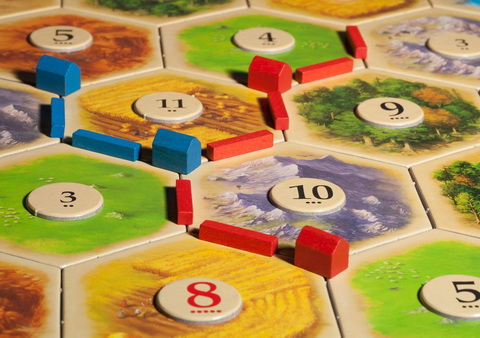7 Wonders Duel is a board game derived from the hugely popular board game 7 Wonders, and is designed for two players.
The game is driven by players' choices between scientific progress and the armed forces and their possible influences. These choices inevitably shape the further development of the players' empires.
In this article, we will provide a detailed overview of the game's basic facts, rules, pros and cons, and other game details.
Key facts
| Created by | In 2015 |
| Type | Strategic |
| Number of players | 2 |
| Age of players | 10+ years |
| Duration | 30 minutes |
| Complexity | medium complexity |
| Indicative price | about 28 - 35.99€ |
The aim of the game
In 7 Wonders Duel, the goal of players is to build and develop their own civilisation so that it eventually becomes prosperous and advanced, and superior to their opponents' civilisation.
Game set
This board game contains the following components:
| Game board | 1 |
| Age I cards | 23 |
| Age II cards | 23 |
| Age III cards | 20 |
| Guild cards | 7 |
| Miracle cards | 12 |
| Military chips | 4 |
| Progress Tokens | 10 |
| A pawn in the conflict | 1 |
| Coin | 31 |
| Book of results | 1 |
| Game rules | 1 |
| Supporting sheet | 1 |

Game rules
The rules of 7 Wonders Duel can be complicated for newcomers. Each player leads a civilisation and builds buildings and wonders. All the buildings built by the players, with the wonders they have created, are called a "city".
The game takes place over 3 different ages, each age using one of 3 decks of cards (first the Age I cards, then the Age II cards and finally the Age III cards).
Each player is given the opportunity to play approximately 10 cards per age to earn coins and strengthen their army. In addition, it is necessary to take an active part in scientific discoveries and to promote the development of your city.
There are 3 ways to win the game: by military or scientific superiority, or by overcoming your opponent with the economic victory of civilisation. Finally, a military or scientific victory can unexpectedly declare the end of the game at any moment and end the whole game.
If by the end of the third century no one has yet won the game, the players add up their victory points and the player with the most points wins the game.
How to win?
There are three eras to build buildings in, so there are three ways to win the game:
1. A scientific victory:
Players can draw Science Cards, each of which has a science symbol on it. If players collect and play two cards with the same symbol, they can collect an Advancement token, which gives additional benefits.

If a player collects six different Science symbols throughout the game, he or she achieves a scientific victory and wins the game.
Explanation: Science symbols are on the science buildings (green cards) and on the progress tokens.
2. Military victory:
Military cards are one of the many possible types of cards that players will encounter in the game. They represent multiple conflicts, indicating which civilisation has the most powerful army.
When a military card is drawn, the player shifts the forces of the conflict to the opponent's side for each cell corresponding to the strength of the drawn card. By shifting the conflict forces to the opponent's side, the player achieves a military victory and wins the game.
3. The economic victory of civilisation:
If, at the end of the third century, neither player has won in science or armies, the player with the best civilisation and the most Victory Points wins.
Players earn victory points for buildings and wonders built, stronger armies, progress tokens collected, and money available. The player with the most points from these sources achieves an economic victory for the civilisation and wins the game.
To achieve victory, players must:
- Start the game with a clear strategy you have devised.
- Conserve and use resources responsibly.
- Be ready to defend against your opponent's attacks and improve your defence.
- Working to foster scientific discovery.
- Construct trade buildings and actively trade with your opponent.
- Be vigilant when building and block your opponent's ability to build strategic facilities.
- Monitor the progress of the game and be ready to complete the milestones you've started or achieve the victories you've set yourself.
- Taking risks to protect yourself from the actions of your opponent.
In the end, it's all about adapting to the game situation, being flexible and changing your strategy as the game and your opponent's actions change.
Preparing for the game
At the beginning of each age, shuffle the appropriate deck of cards and arrange the 20 cards according to the structure of the age being played.
Please note that some cards should be closed and others should be turned over.

- The game board is placed between two players.
- The conflict pawn should be placed on the central space of the board.
- One player must place the army chips on the corresponding boxes on the game board.
- After shuffling, five chips must be placed randomly on the game board.
- Any remaining progress tokens must be returned to the box.
- Each player receives seven coins from the bank.
- You need to sort the age cards by their backs/age.
- Three cards must be drawn at random from each deck.
- Select three Guild cards and add them to the Age III deck (without looking at them).
- The remaining Guild cards are returned to the box.
Game progress
In 7 Wonders Duel, each player plays in their own order. The first player starts in the 1st century.
During their turn, players must select an "available" card from the entire card structure and play it. An accessible card is a card that is not partially covered by other cards.
The player can play the selected card in one of three different ways:
1. Build a building:
To build a building, the player must pay the price of the building and place it in front of him. From now on, this building belongs to the player's city.
2. Fold the card to get coins:
The player can discard the card and collect 2 coins, plus an additional coin for each yellow card in his city, from the bank. This money appears in the player's city treasury.
3. Create a miracle:
The player can pay the cost of creating the miracle (not the cost of the age card) and place his age card in a space that is partially covered by the miracle card being created.
The age card used now no longer has any direct effect - it is simply used to show that a miracle has occurred.
When a card is drawn, the player must reveal all the cards that have been turned over and are available.
Collecting Miracle Cards
Players must collect their Miracle Cards for the game:
- Choose one player to start the selection process.
- Shuffle all Miracle Cards.
- Place the top four Miracle Cards face down between the players.
- The first player must choose one Miracle Card for themselves.
- The second player must choose two of the remaining Miracle Cards.
- The last remaining Miracle Card goes to the first player.
- Open the other four Miracle Cards.
- The second player first chooses a Miracle card.
- The first player then chooses two cards and the second player receives the remaining card.
- The remaining Miracle Cards are returned to the box.
- Players must place their Miracle Cards on the table at the side of the playing area.

For the first game, each player needs to have these Miracle Cards and ignore the collection of Miracle Cards:
1 player:
- The Pyramids
- The Great Lighthouse
- The Temple of Artemis
- Statue of Zeus (The Statue of Zeus)
2 players:
- Circus Maximus (Circus Maximus)
- Piraeus (Piraeus)
- The Appian Way (The Appian Way)
- The Colossus
The pros and cons of the game
7 Wonders Duel is a great board game with many advantages, so let's take a look at some of them.
Game pluses
✅ Two-player format: Game customised for two players.
✅ Fast and fun: Short epochs and fast-changing cards make for a dynamic gameplay.
✅ Variety of strategies: Players can choose different strategies, such as leading in science, leading in the military, or investing in the economy.
✅ Mobile app: You can play 7 Wonders Duel on your mobile device.
✅ Replay: Replayability is available with two new expansions that add new elements and strategic options.

Minuses
It is also important to know about the downsides of the game so that you can decide whether it is the right game for you.
❌ Complex rules: New players may need a little more time to get to grips with the rules and understand all the meanings and interactions of the cards.
❌ Not the right game for company: The game is not suitable for more than two people.
Game innovations
This board game has two expansions, Pantheon (2016) and Agora (2020), but there is no option to play the expansions alone, as the main 7 Wonders Duel game is required.
A mobile app for the game is also available on the Google Play Store (for Android 7 Nougat and above) and the App Store (for iOS 10 and above).
Conclusion
7 Wonders Duel is a popular two-person board game based on the original 7 Wonders Game.
The game is about the player's initial choice - whether to promote science or to do so with the military power that determines the fate of his empire.
So if you're looking for a game that combines strategy, tactics and historical context, this game should definitely be in your board game collection!
What is the objective of 7 Wonders Duel❓
The main objective of the game is to shape and develop your civilisation, with the aim of making it great, advanced and eventually surpassing your opponents' civilisation.
Can this board game be played by one player❓
❌ No. The game is for 2 players.
What is the difficulty level of this game❓
This game is classified as a medium difficulty board game.
What is the duration of the game❓
The game lasts about 30 minutes.
This board game is recommended for ages 18+❓
According to the rules, the game is open to children over 10 years of age.





